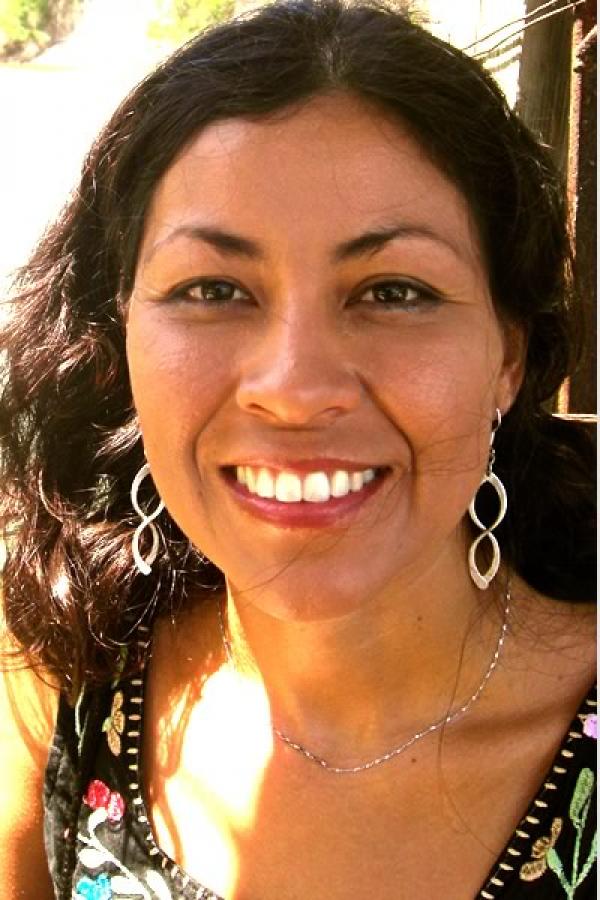Emmy Pérez

Photo by Britt Haraway
Bio
Emmy Pérez, originally from Santa Ana, California, has lived on the Texas-Mexico border for 16 years. A graduate of Columbia University and the University of Southern California, she is the author of With the River on Our Face and Solstice.
She is a previous recipient of fellowships/awards from CantoMundo, New York Foundation for the Arts, the Fine Arts Work Center in Provincetown, the Alfredo Cisneros Del Moral Foundation, and the San Francisco Foundation (James D. Phelan Award). She is a member of the Macondo Writers’ Workshop founded by Sandra Cisneros for socially engaged writers.
Currently, she’s an associate professor in the MFA program at the University of Texas Rio Grande Valley and serves as interim director for the Center for Mexican American Studies. Over the years, she and her students have taught creative writing in detention centers and the community. In 2012, she received a UT Regents’ Outstanding Teaching Award.
Author's Statement
Receiving this award reminds me that gratitude is a deep feeling that can at first (yes) trigger tears because of what was at stake, is at stake, in the lives that have been (indirectly) acknowledged in the work itself, including my parents’ many obstacles as children, and later, their sacrifices in support of my education. At the same time, I’m reminded it is necessary to keep taking chances in what I write, aesthetically and in the subject matter, regardless of potential acceptance beyond our own fleeting fulfillment. I remember taking these chances writing my most recent collection With the River on Our Face, and later in assembling my application with a few poems from it, along with a longish, unpublished work from my latest manuscript-in-progress that was lighting quite a fire under me at the time and still does, as it’s about, in part, which children survive and which do not, in thinking about refugee children fleeing violence and more in Central America and Syria andthe oppression of children throughout history.
Teaching creative writing and Mexican American Studies in a border community is very gratifying, though this fellowship encourages me to apply for professional development leave for the first time and helps my chances. Either way, the fellowship will allow me to afford additional, quality childcare for my two small children and make significant progress on my latest manuscript. This award further helps me realize what I’m coming to know: that writing books doesn’t have to take as long for me anymore, that it doesn’t have to be such a precious process, that I can try to prioritize it as much as everything else that is of meaningful and magical consequence in my life, which is much. And not stop there, in living with continued purpose and gratitude.
Downriver Río Grande Ghazalion
Drive into the Valley, past a field of old farm equipment.
Near the tip of Tejas: sal del rey, blatant farm equipment.
I never bent into onion fields or declined sweet strawberries.
The kid in everyone’s kitchen, escaping farm equipment.
When I think about seeing you, I want to jump on your back.
I confess—you’re sexy, luxury—let’s paint equipment
The color of parakeets congregating, squawking on 10th
Street McAllen power lines, strip mall trees, fading equipment.
99 cent meals. Surreal pickles like vine fetuses in jars.
Wrinkled wienies on a Stripes treadmill, saintly farm equipment.
Julia (te necesito) ¿dónde estás? ¿En el barrio
De nuestra nostalgia? ¿En el Río Grande de Loíza?
let’s
weld
jade
cave
excavate equipment
repatriate
shell and bone
shards and kernels
study hopi
dry farming
dare roman
empire
incan farm terraces
aztec chinampas
mississippi plantations
california strawberries
seedless watermelons, grapes
cherries still need their pits
suck and spit them like chew
Sometimes I defer to the blues, tejanas, two chachalacas
Rustling in ebanos, and ebanos in chachalacas
río
bravo ~grande
caracoles snails
both spiral
galaxies
Agha Shahid Ali prayed for each couplet’s own identity
Sin fronteras. Linked by rhyme, refrain, y su nombre de diosas
(& colonizers.)
Snake, bobcat, great horned owl, pauraque, bats, tlacuache
(medicine).
Burrowing vato owls protect their land, urban EPT.
Return? To rivers, loves, monte, el chalán? Erase citrus?
So-called fences? Faith in Boca Chica~Gulf of México, fresh salt-
(water confluences)?
Salt is old, older than cranium.
What’s older? Salt or water?
It’s time to move beyond binaries, old loves. Remember eyes.
Not love but eyes—eyes are love. Yes. Remember the smell of skin
(go swimming)
El día en que tú naciste, nacieron todas las flores.
The scent of water. A tolerance for ambiguity
In nepantla: between Hurricanes Dolly and Alex (flooding)
Terremote, huracán
You lithium
The grass
Mineral, metal
Leaf cuts the ants clip and carry
Ant path
Goat
Sheep crossing
Rio Grande
Gorge
It takes hours to defang cactus. You nursed an orange all of
Christmas Day; at night, just before going to bed, you ate it.
A ~ marks your open text unions. Sign your ~name in email,
Feel your flirty ambiguity, friendly besito.
1. The day you were born, all the flowers were born – from traditional song Las Mañanitas
2. “A tolerance for ambiguity,” “sin fronteras,” & “It takes hours to defang cactus” by Gloria Anzaldúa
3. Richard Wright

